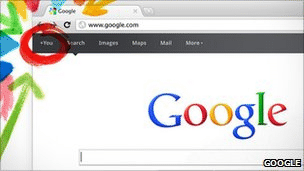
Twitter made a complaint regarding changes made by Google to integrate its social network Google+ into search results.
The new feature is called Search plus Your World, will automatically push results from Google+ up the search rankings.
Tweeting on the news, Twitter’s lawyer Alex Macgillivray described it as a “bad day for the internet”.
Google is determined to push its social network in the face of continued rivalry with Facebook.
The current changes were about even greater personalization, it said. It already includes personal search history in its search algorithms.
The three changes are:
• Personal Results – which enable users to find information such as Google+ photos and posts, both their own and those shared specifically with them, that only they will be able to see on their results pages
• Profiles in Search – both in autocomplete and results, users will be able to find people they are close to or might be interested in following
• People and Pages – helps users find people profiles and Google+ pages related to a specific topic or area of interest, and enable people to follow them with just a few clicks.

“Search is pretty amazing at finding that one needle in a haystack of billions of webpages, images, videos, news and much more,” said Amit Singhal in the company’s official blog.
“But clearly, that isn’t enough. You should also be able to find your own stuff on the web, the people you know and things they’ve shared with you, as well as the people you don’t know but might want to… all from one search box,” he added.
Twitter’s general counsel Alex Macgillivray tweeted in response to the changes: “Bad day for the internet. Having been there, I can imagine the dissension @Google to search being warped this way.”
Alex Macgillivray had previously been employed at Google.
Twitter expanded his point in an official statement.
“For years, people have relied on Google to deliver the most relevant results any time they wanted to find something on the internet.
“Often, they want to know more about world events and breaking news. Twitter has emerged as a vital source of this real-time information, with more than 100 million users sending 250 million tweets every day on virtually every topic. As we’ve seen time and time again, news breaks first on Twitter; as a result, Twitter accounts and tweets are often the most relevant results.
“We’re concerned that as a result of Google’s changes, finding this information will be much harder for everyone. We think that’s bad for people, publishers, news organisations and Twitter users.”
Google hit back at the criticisms.
”We are a bit surprised by Twitter’s comments about Search plus Your World, because they chose not to renew their agreement with us last summer and since then we have observed their rel=nofollow instructions,” Google said in a statement.
This refers to a technical barrier which makes it difficult for Google to rank Twitter information, a spokeswoman explained.
There is also little sharing between Google and its other big rival Facebook.
Stepping into the growing row between the three firms, Google chief executive Eric Schmidt told MarketingLand magazine that his company was not favouring its own social network over Facebook and Twitter. He said that all would be treated equally if the two rivals granted the search giant the right permissions to access their content.
Search expert John Battelle said in his blog post that social search would mean little until Facebook and Google settled their differences and offered consumers what they really wanted – Facebook data integrated with Google’s search.
“The unwillingness of Facebook and Google to share a public commons when it comes to the intersection of search and social is corrosive to the connective tissue of our shared culture,” he said.